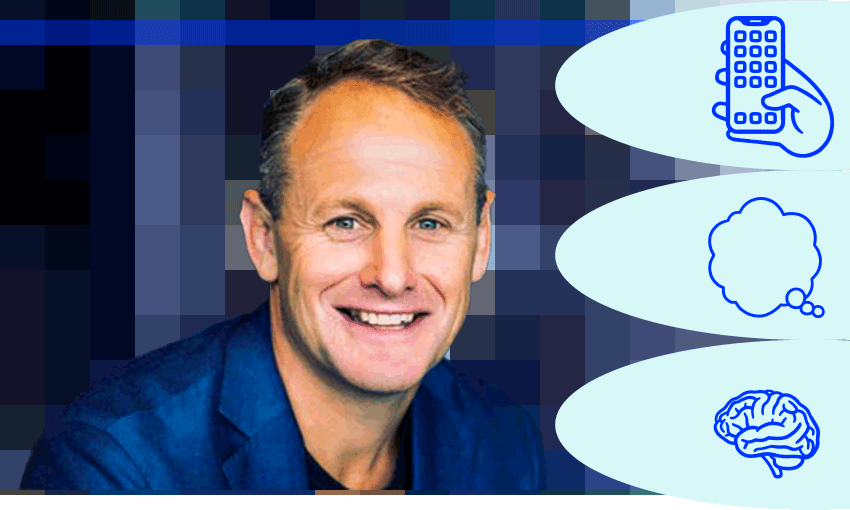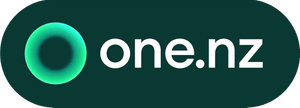Joe Goddard’s work is all about keeping our connections steady, but his home life is all about balancing the need to stay connected with things that bring joy in the real world.
This story was created in paid partnership with Vodafone.
When Joe Goddard started as the experience and commercial director at Vodafone in July 2021 he knew his role was to help guide customers through Covid-19. He didn’t know that after just five weeks in the job he’d be forced to spend the vast majority of the next seven months (and counting) working remotely under the restrictions of Covid-19.
While he misses the collaboration and connection of the office, it’s given Goddard an acute awareness of how essential his role is in supporting Vodafone customers – especially its small business clients – through this period. Communication has never been more important as Covid forces people to connect in different ways through the power of technology. And it’s Goddard and his team’s job to make sure that experience is positive – and when it’s not they need to find the solution.
“Our focus is on delivering great connectivity wherever you are – whether it’s while visiting customers, at the home office, sports field watching your kids play, or chilling out at the beach. We’re investing hundreds of millions of dollars into our mobile and fixed networks every year,” he says.
Home Screen is brought to you by Vodafone. Technology is changing the way we interact with the world. Learn more about how Vodafone can help you to embrace new ways of working at vodafone.co.nz/workfreerange.
Goddard was drawn to Vodafone by CEO Jason Paris – whom he worked with at Spark – and Paris’s unique approach to running the business. (Paris famously spends hours on social media, answering individual queries and complaints from customers.)
“He’s really ambitious, but he does it in a really un-corporate way,” Goddard says.
Goddard is equally committed. Last year he set his team a target, promising if they reached it he’d get the number tattooed. They hit it. On 17 February, Goddard came through on his end of the deal – and now has 40 tattooed on his upper thigh. The Spinoff spoke to Goddard about what it was like to start a dream job in the middle of a pandemic.
What was it like starting such a significant role in the middle of the pandemic, especially one that is intimately tied to supporting Vodafone customers through this crisis?
It was a crisis for a lot of our customers, especially small businesses. New Zealand’s a country of small businesses and the people who work for small businesses are also part of households. So they’re the lifeblood of our company.
I got five weeks in the office before we went back into level four, which I was really thankful for. So I got to meet a lot of my team. It was really great to build up some sort of relationships with some of the people.
One of the most rewarding things I first got to work on was an idea that we ran through social media called Pay It Forward, where we gave all of our employees a chance to give back to small businesses. It was a little gesture compared to what small businesses do for New Zealand, but the response – throughout our staff, throughout the small businesses that we spoke to – has been really great.
What actually is your role? And how is it part of Vodafone’s ambit?
My team’s responsible for all of the telco products and how customers experience those. We’re responsible for data, and how we use that to help our customers is really important. We create the experience of how customers interact with our brand. And with marketing part of this mix, as a massive fan I’m lucky the Warriors sponsorship sits with me.
We operate in the telco industry where everyone’s got a mobile network, everyone sells the same things. So how you package those up to customers and the experience around it is the defining factor in the market, along with our front line staff.
What’s your bubble look like, who’s at home with you?
So I’ve got my wife, Amanda, and two kids, Zach (11) and Lily (13). It’s been challenging adjusting to working at home. I miss the social interaction of the office.
As our kids get older Amanda I are really aware of the influences of social media. And during lockdown, when kids are talking even more through social media, everything is magnified.
And it’s something we’re thinking about at Vodafone: we help put these things in kids’ hands, how do we help parents to help their kids? And it’s really important. I wonder about the long term effects across the world of lockdowns on kids. It’s not only the schooling, but social media especially.
Kids are constantly exposed to that pressure every single day. It doesn’t stop at three o’clock when they go home, even home can feel like it’s not safe. So, I think we as an industry have got a big job to help New Zealand parents with how they negotiate that.
Working in telecommunications, do you feel that responsibility for the way you’re keeping us connected, especially during the pandemic?
It’s a privilege. It’s a privilege being in an industry where New Zealanders rely on you every single day. That’s humbling. We haven’t been an industry that’s loved. Even so, when I look across my time in the industry, we’re doing things a lot better than what we did 10 years ago.
However, New Zealanders’ lives depend a lot more on the services that we provide than they did 10 years ago. And then you’ve got other companies who have done things around customer experience. They’ve just lifted the bar. And we haven’t gone as fast as other companies. So we had a lot of work to do.
But we go to work every day, knowing that New Zealanders depend on our service. Especially businesses and our corporate customers.
How essential to your job is your phone and that ability to stay connected?
It would make my job a lot harder and a lot more regimented without it. Our services go 24/7, so our customers need us every single day, every single hour. So the phone just gives me the ability and flexibility and freedom to be able to help customers all the time.
That could be a curse in terms of work life balance, but the time you save by being able to sort out customer’s problems over a phone, then going back into the office, I just couldn’t imagine doing it without a phone.
The fact that we get to carry around this connectivity, this access to information, the social participation in our pockets is pretty incredible.
Over the Christmas holidays our business goes on and I was able to make sure sales were okay, and make sure retention’s good, check on customer complaints. We go to a little village called Hatepe, which is just south of Taupo. There used to be no connection there, and so you’d have to drive into town to be able to get your emails. But it’s all connected out there now.
How good are you at balancing work and life when you have that permanent ability to be able to check your emails, check on sales, check on retention?
I’m getting better. For a time, I got addicted to how many customers we acquired the day before and how many we lost. I need to break the habit on those a bit more. Just little things, like turning off all notifications, making sure when you go down the beach, you don’t take your phone. You’re in the moment. So trying to be more present with the family and friends, and putting that little thing down is something I’m working on.
Do you have any specific tools that you use to try and take those moments?
A trick is to spend some time organising your day so you make that as efficient and as valuable as possible, and make sure that you’ve got the balance right. I’ve got to exercise every day. So making sure that that’s in my diary. The start of the day is about making sure that the schedule looks right, and at the end of the day it’s thinking about tomorrow.
What are your most important apps?
I use Spotify a lot. We’ve just moved over to Spotify Family, because my son always thought it was a great joke to, halfway through a run, to be able to butt in with The Muppets, so that was a big thing. I just have one playlist and I just keep on adding to it. My wife keeps telling me I need to move it into genres, but I just like one big long one.
I try to use [meditation app] Headspace every day. And so as long as I get my routine right, I get my head right. So just spending 10 or 15 minutes a day, doing a bit of breathing through Headspace. I try to get that in the mornings. So, that’s important.

